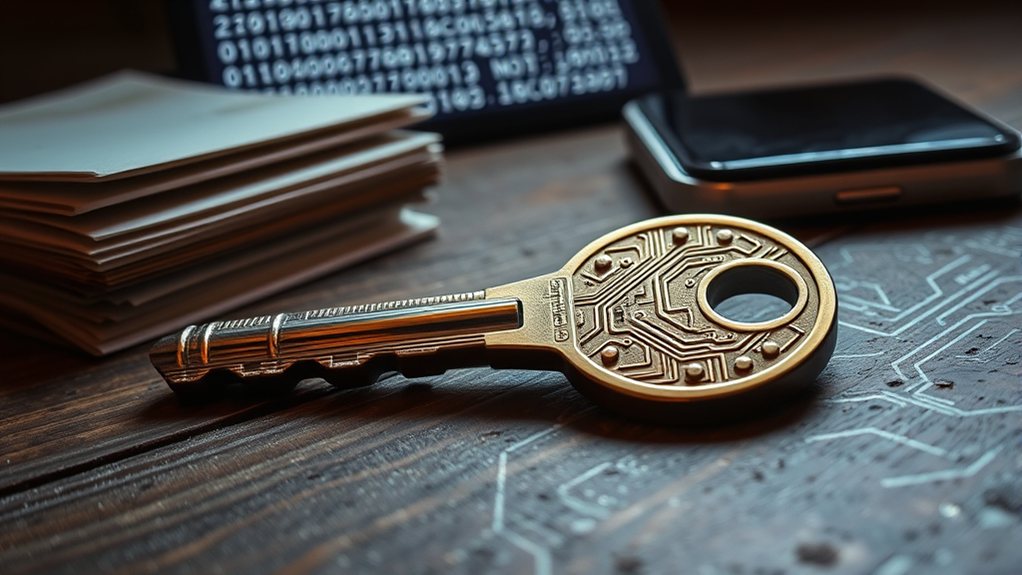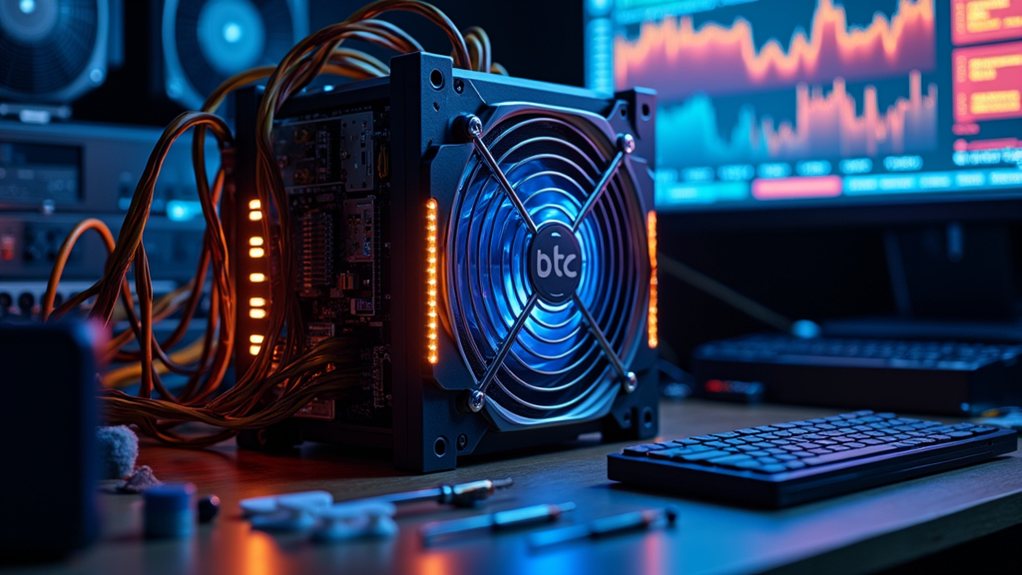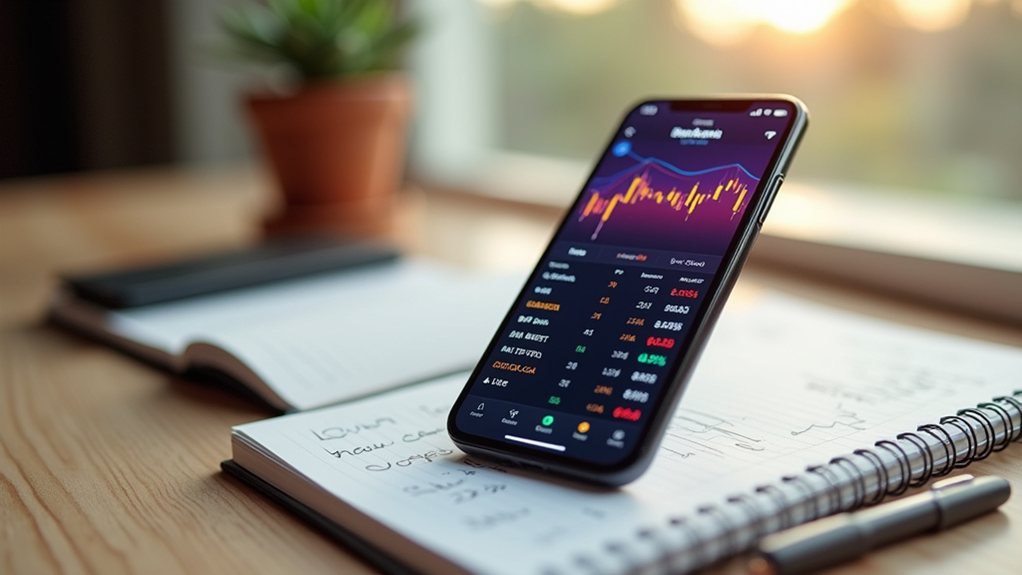Private keys are the master key to your digital assets in the crypto world. Lose it, and your money's gone forever. No customer service to call. These 256-bit mathematical marvels can't be reverse-engineered from public keys. Storage options include paper wallets (can get damaged), hardware wallets (offline security), and software wallets (convenient but risky). Millions in Bitcoin sit locked away due to lost keys. Smart security practices separate the lucky from the sob stories.

The digital fortress of cryptocurrency stands or falls on a single point of vulnerability: the private key. It's just a string of random letters and numbers. Nothing special to look at. But this unassuming code holds absolute power over your digital assets. Think of it as the master key to your crypto kingdom – lose it, and you're locked out forever. No appeals. No password resets. No sympathy.
Private keys are mathematical marvels. They're typically 256 bits long, which translates to 64 hexadecimal characters. That's one of 2^256 possible combinations. An astronomically large number. Most wallets simplify this complexity into 12-24 word phrases. Easier to write down, still impossible to guess. The crypto wallet software generates these keys through randomization, creating a unique identifier that's mathematically linked to a corresponding public key.
The relationship between private and public keys forms the backbone of cryptocurrency security. While your public key creates addresses for receiving funds and can be shared freely, the private key remains hidden. It signs transactions, proving ownership without revealing itself. One-way cryptographic functions make it impossible to reverse-engineer a private key from a public one. Pretty clever system, actually.
The crypto paradox: your public key shouts to the world while your private key whispers only to the blockchain.
Storage options abound, each with trade-offs. Paper wallets? Old-school but effective – until they meet water or fire. Hardware wallets keep keys offline in specialized devices. Software wallets offer convenience but risk online exposure. Some crypto diehards even memorize their seed phrases as "brain wallets." Good luck with that when you're 80. Many experts recommend diversifying with multiple storage methods to balance security and accessibility.
The consequences of key mismanagement are brutal. Millions in Bitcoin sit forever inaccessible because of lost keys. No customer service to call. No corporation to sue. Just the cold, immutable math of the blockchain. The system doesn't care about your sob story.
Private keys face constant threats. Phishing emails wanting "just a quick verification" of your seed phrase. Malware designed specifically to hunt for wallet files. Social engineering tactics to trick you into revealing your keys. Even the randomness used to generate keys must be truly random – weak randomization creates predictable keys. Easy pickings.
Security best practices exist for a reason. Cold storage keeps keys offline. Encryption adds extra protection. Multi-signature setups require multiple keys to authorize transactions. Hardware wallets resist digital threats. Regular backups prevent catastrophic loss. FIPS 140-2 validated solutions offer government-grade security standards that many serious crypto investors prefer. Proper key management practices also include rotating keys periodically to minimize the risk of compromise over time.
But ultimately, the responsibility falls squarely on the user. That's cryptocurrency's promise and its peril – complete control, complete responsibility.
Frequently Asked Questions
Can I Change My Private Key if Needed?
Private keys can't be changed. Period.
Once generated, they're permanent fixtures in the cryptocurrency universe. If a key is compromised or lost, there's no "edit" button. Users must generate an entirely new key and transfer their assets to the new address.
The old key? Still exists. It's just abandoned. Like moving houses instead of remodeling.
Security concerns? Generate new keys, not modify existing ones.
What Happens if Someone Else Discovers My Private Key?
Someone finding your private key is catastrophic.
They gain full control of your crypto wallet. Instant transfers, no reversals. Game over.
Average losses exceed $100,000. Your funds disappear forever.
Insurance? Doesn't cover this. Exchanges? Not their problem.
You'll need to scramble – transfer remaining assets, close accounts, potentially file reports.
And that reputation hit? Brutal.
Hardware wallets exist for a reason, folks.
How Are Private Keys Mathematically Related to Public Addresses?
Private keys and public addresses have a one-way mathematical relationship.
First, a random private key is generated. Then, elliptic curve multiplication (a one-way function) creates a public key from it.
Finally, the public key gets hashed to produce the public address. You can't reverse-engineer this process.
Pretty clever, right? It's like making hamburger – easy to grind meat, impossible to turn it back into a steak.
Are Hardware Wallets Completely Safe From Private Key Theft?
Hardware wallets aren't completely safe. Nothing is.
They're considerably more secure than software wallets, sure. Supply chain attacks, side-channel vulnerabilities, and social engineering still pose threats. Manufacturers work constantly to patch vulnerabilities.
Physical security features help, but determined attackers with enough resources could potentially extract keys.
The real question: are they secure enough for your needs? For most people, absolutely.
Can Quantum Computers Break Private Key Security?
Yes, quantum computers pose a serious threat to private keys. Not today though. Theoretical quantum algorithms like Shor's could crack current encryption systems exponentially faster than classical computers.
But relax—we're not there yet. Current quantum computers are laughably weak compared to what's needed.
The industry isn't sitting idle either. Post-quantum cryptography standards are being developed.
The timeline? Maybe 15-50 years before your Bitcoin wallet needs to worry.








